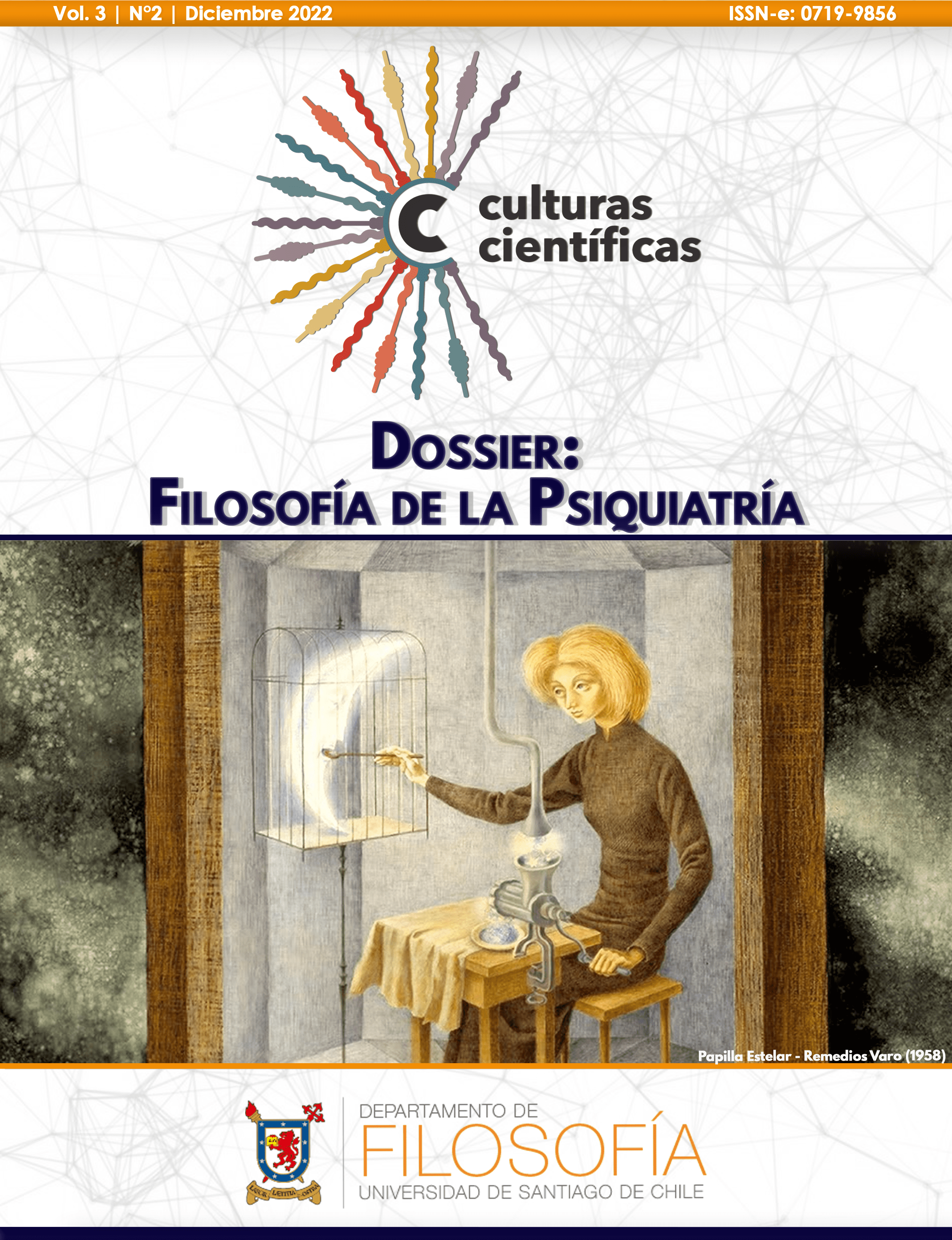Delirio como creencia
un análisis filosófico
DOI:
https://doi.org/10.35588/cc.v3i2.5685Palabras clave:
Psicopatología, Doxa, Realidad, Psicosis, VitalidadResumen
A lo largo de la tradición psicopatológica, incluso de la pre-fenomenológica, se encuentra la categorización del delirio como creencia. Jaspers asumió ese uso y lo fundó fenomenológico-existencialmente, definiendo su carácter de convicción. El concepto de creencia ha tenido un largo recorrido dentro de la historia del pensamiento, aunque recientemente se ha intensificado el debate acerca de la visión doxástica del delirio. En virtud de lo ya mencionado, en el presente artículo presentamos un análisis conceptual de la creencia, con el objetivo de identificar de manera precisa los aspectos esenciales que permiten al delirio definirse según ella. De esta manera, se discutirán algunas de las principales incursiones realizadas en el concepto desde la antigüedad periplatónica hasta José Ortega y Gasset, remarcando en cada pensador las directrices esenciales de su aproximación a la creencia. A su vez, introducir al filósofo español al debate psicopatológico permitirá incluir en la discusión dos aspectos importantes que creemos pueden ser fructíferos para la discusión filosófica sobre el delirio: la diferencia entre ideas y creencias, y la vitalidad de estas últimas. Finalmente, hacemos referencia al actual debate pro- y antidoxástico, haciendo hincapié en la necesidad de considerar la amplitud del concepto de creencia en su genealogía histórica. Con base en ello estaríamos en condición de acercarnos a la visión doxástica moderada que han defendido autoras como Lisa Bortolotti.
Descargas
Referencias
Aristóteles. (2006). Analíticos Primeros. En Tratados de lógica : (Organon) / II (1a ed., 2a reimp.) (pp.85-287). Gredos.
Aristóteles. (2014). Metafísica. Gredos.
Bain, A. (1865). The Emotions and the Will. Longmans, Green, and Co.
Barnes, J. (1988). Epicurean signs. Oxford Studies in Ancient Philosophy.
Berrios, G. E. (1991). Delusions as “Wrong Beliefs”: A Conceptual History. British Journal of Psychiatry, 159(S14), 6-13. https://doi.org/10.1192/S0007125000296414
Blankenburg, W. (2007). Psychopathologie des Unscheinbaren (M. Heinze, Ed.). Parodos Verlag.
Bortolotti, L. (2013). Delusions and Other Irrational Beliefs. Oxford University Press. https://doi.org/10.1093/med/9780199206162.001.1
Bortolotti, L., y Miyazono, K. (2015). Recent Work on the Nature and Development of Delusions. Philosophy Compass, 10(9), 636-645. https://doi.org/10.1111/phc3.12249
Brentano, F. (1973). Psychologie vom empirischen Standpunkt. Erster Band (O. Kraus, Ed.). Meiner.
Broniak, C. J. (1996). James’s Theory of Fringes. Transactions of the Charles S. Peirce Society, 32(3), 443-468. http://www.jstor.org/stable/40320611
Thoma, Samuel - Brückner (2017). Wahn, Weltanschauung und Habitus. Zur sozialwissenschaftlichen Kritik der Theorie des Wahns im Werk von Karl Jaspers. Discipline filosofiche, 27(1), 223-247. https://doi.org/10.1400/250775
Burnyeat, M. F. (2012). The origins of non-deductive inference. En Explorations in Ancient and Modern Philosophy (Vol. 1, pp. 112-151). Cambridge University Press. https://doi.org/10.1017/CBO9780511974052.008
Cabaleiro Goás, M. (1959). Temas psiquiátricos I. Cuestiones generales y direcciones de investigación. Paz Montalvo.
Cabaleiro Goás, M. (1966). Temas psiquiátricos II. Algunas cuestiones psicopatológicas generales. Paz Montalvo.
Connors, M. H. y Halligan, P. W. (2020). Delusions and theories of belief. En Consciousness and Cognition, 81, 102935. Academic Press Inc. https://doi.org/10.1016/j.concog.2020.102935
Connors, M. H., y Halligan, P. W. (2021). Phenomenology, delusions, and belief. The Lancet Psychiatry, 8(4), 272-273. https://doi.org/10.1016/S2215-0366(21)00027-4
Conrad, K. (1958). Die beginnende Schizophrenie. Versuch einer Gestaltanalyse des Wahns. Thieme.
Conrad, K. (1994). La esquizofrenia incipiente (1958). Revista de La Asociación Española de Neuropsiquiatría, 14(49), 319-325.
Dilthey, W. (1974). BeitrÄge zur Lösung der Frage vom Ursprung unseres Glaubens an die RealitÄt der Außenwelt und seinem Recht. En Die geistige Welt. Einleitung in die Philosophie des Lebens. Gesammelte Schriften V. Band (pp. 90-138). Teubner Verlagsgesellschaft.
Doerr-Zegers, O. y Dörr-Álamos, A. (2018). Perturbaciones de la intencionalidad en la esquizofrenia y en la depresión. Actas Españolas de Psiquiatría, 46(6), 234-241.
Ebert, T. (1974). Meinung und Wissen in der Philosophie Platons. De Gruyter. https://doi.org/10.1515/9783110834826
Expósito Ropero, N. (2020). Para una revisión de la teoría orteguiana de la creencia. Dos notas de Manuel Granell. Boletín de Estudios de Filosofía y Cultura Manuel Mindán, 15, 137-154.
Feyaerts, J., Henriksen, M. G., Vanheule, S., Myin-Germeys, I., y Sass, L. A. (2021). Delusions beyond beliefs: a critical overview of diagnostic, aetiological, and therapeutic schizophrenia research from a clinical-phenomenological perspective. The Lancet Psychiatry, 8(3), 237-249. https://doi.org/10.1016/S2215-0366(20)30460-0
Fisch, M. H. (1954). Alexander Bain and the Genealogy of Pragmatism. Source: Journal of the History of Ideas, 15(3), 413-444. https://www.jstor.org/stable/2707763
Fuchs, T. (2015). The intersubjectivity of delusions. World Psychiatry, 14(2), 178-179. https://doi.org/10.1002/wps.20209
Fuchs, T. (2019). Delusion , reality and intersubjectivity : A phenomenological and enactive analysis. Phenomenology and Mind, (8), 120-143. http://www.doi.org/10.17454/pam-1810
Fuchs, T. (2020). Delusion, reality, and intersubjectivity a phenomenological and enactive analysis. Philosophy, Psychiatry and Psychology, 27(1), 61-79. https://doi.org/10.1353/ppp.2020.0009
Gigante, M. (2002). Philodemus in Italy: the books from Herculaneum. University of Michigan Press ; University Presses Marketing. http://dx.doi.org/10.3998/mpub.13820
Greenblatt, S. (2011). The Swerve: how the world became modern. W.W. Norton.
Hume, D. (1992). Tratado de la naturalea humana; Autobiografía. Tecnos.
Hume, D. (2011). A Treatise of Human Nature. Clarendon. http://dx.doi.org/10.1093/oseo/instance.00046221
Husserl, E. (1939). Erfahrung und Urteil. Untersuchungen zur Genalogie zur Genealogie der Logik (L. Landgrebe, Ed.). Academia Verlagsbuchhandlung.
Husserl, E. (1950a). Cartesianische Meditationen und Pariser VortrÄge. Nijhoff.
Husserl, E. (1950b). Ideen zu einer reinen PhÄnomenologie und phÄnomenologischen Philosophie I: Allgemeine Einführung in die reine PhÄnomenologie. Martinus Nijhoff. http://dx.doi.org/10.28937/978-3-7873-3905-1
Husserl, E. (1954). Die Krise der europÄischen Wissenschaften und die transzendentale PhÄnomenologie (Husserliana Band VI) (W. Biemel, Ed.). Martinus Nijhoff.
Husserl, E. (1966). Analysen zur passiven Synthesis: Aus Vorlesungs- und Forschungsmanuskripten 1918-1926. Nijhoff.
Husserl, E. (1975). Logische Untersuchungen. Erster Band: Prolegomena zur reinen Logik (E. Holenstein, Ed.). Nijhoff.
Husserl, E. (1979). AufsÄtze und Rezensionen: (1890-1910) (R. Bernhard, Ed.). Nijhoff.
Husserl, E. (1980). Phantasie, Bildbewusstsein, Erinnerung: Zur PhÄnomenologie der anschaulichen VergegenwÄrtigungen. Nijhoff.
Husserl, E. (1984). Logische Untersuchungen. Zweiter Band - I. Teil: Untersuchungen zur PhÄnomenologie und Theorie der Erkenntnis. Nijhoff.
Husserl, E. (2008). Die Lebenswelt: Auslegungen der vorgegebenen Welt und ihrer Konstitution (R. Sowa, Ed.; Vol. 39). Springer Netherlands. https://doi.org/10.1007/978-1-4020-6477-7
James, W. (1898). Philosophical Conceptions and Practical Results. University Chronicle; Princeton University Press. http://dx.doi.org/10.2307/j.ctvcm4fzv.7
James, W. (1918). The Principles of Psychology (Vol. 1). Henry Holt and Co.
James, W. (1994). Principios de Psicología. FCE.
Jaspers, K. (1953). Allgemeine Psychopathologie (6.a ed.). Springer Verlag.
Lasaga Medina, J. (1994). Las creencias en la vida humana (una aproximación a la distinción orteguiana entre ideas y creencias). Endoxa, 1(4), 205-232. https://doi.org/10.5944/endoxa.4.1994.4825
Lasaga Medina, J. (2003). José Ortega y Gasset (1883-1955): vida y filosofía. Biblioteca Nueva: Fundación José Ortega y Gasset.
Locke, J. (1999). Ensayo sobre el entendimiento humano. FCE.
Lorenzo Alquézar, R. (1999). El concepto de creencia en Ortega. UNED.
Lorenzo Alquézar, R. (2007). Fenomenología de la creencia. La primera reflexión sobre el concepto de creencia en Ortega y Gasset. Studium: Revista de Humanidades, 13(13), 141-170.
Manetti, G. (2002). Philodemus De signis: An important ancient semiotic debate. Semiotica, 2002, (138), 279-297. https://doi.org/10.1515/semi.2002.008
Manetti, G. (2011). Theories of the sign in classical antiquity. Indiana Univ. Press.
McCormick, M. S. (2022). Belief as emotion. Philosophical Issuesl, 32(1), 104-119. https://doi.org/10.1111/phis.12232
Milagro Pinto, A. (2015). Las creencias en el proyecto metafísico de Ortega. UNED.
Miyazono, K. (2015). Delusions as harmful malfunctioning beliefs. Consciousness and Cognition, 33, 561-573. https://doi.org/10.1016/j.concog.2014.10.008
NI, L. (1999). Seinsglaube in der PhÄnomenologie Edmund Husserls (Vol. 153). Springer Netherlands. https://doi.org/10.1007/978-94-011-4693-7
Nietzsche, F. (1999). SÄmtliche Werke. Kritische Studienausgabe in 15 BÄnde. En G. C. und M. Montinari (Ed.), Wille zur Macht. De Gruyter.
Ortega y Gasset, J. (1964a). En torno a Galileo. En Obras completas. Tomo V (1933-1941) (6.a ed., pp. 12-165). Revista de Occidente.
Ortega y Gasset, J. (1964b). Ideas y creencias. En Obras completas. Tomo V (1933-1941) (6.a ed.). Revista de Occidente.
Ortega y Gasset, J. (1964c). ¿Qué es Filosofía? En Obras completas. Tomo VII (1948-1958) (2., pp. 274-439). Revista de Occidente.
Ortega y Gasset, J. (1966). Goethe desde dentro. En Obras completas. Tomo IV (1929-1933) (6., pp. 382-543). Revista de Occidente.
Ortega y Gasset, J. (1982). Investigaciones psicológicas. Revista de Occidente en Alianza Editorial.
Ortega y Gasset, J. (2007a). Introducción a los problemas actuales de la filosofía (Conferencias de Buenos Aires). En Obras completas. Tomo VII (1902-1925). Obra póstuma. Taurus.
Ortega y Gasset, J. (2007b). Sistema de la psicología. En Obras completas. Tomo VII (1902-1925). Obra póstuma. Taurus.
Owen, D. (2003). Locke and Hume on belief, judgment and assent. Topoi, 22(1), 15-28. https://doi.org/10.1023/A:1022155914522
Peirce, C. S. (1877). The Fixation of Belief. Popular Science Monthly. https://www.unav.es/gep/FixationBelief.html#nota*
Peirce, C. S. (1878). How to Make our Ideas Clear. Popular Science Monthly, 12, 286-302.
Peirce, C. S. (1934). The Collected Papers of Charles Sanders Peirce, Vol. V: Pragmatism and Pragmaticism. Harvard University Press.
Peirce, C. S. (1982). Writings of Charles S. Peirce: a chronological edition. (Vol. 1). Indiana University Press.
Platón (1988). Diálogos. Volumen IV: La República. Madrid: Editorial Gredos
Quinton, A. (1967). Knowledge and belief. En P. Edwards (Ed.), The Encyclopedia of Philosophy. Macmillan.
Ratzinger, J. (1970). Introducción al cristianismo. Sígueme.
Ritunnano, R. y Bortolotti, L. (2021). Do delusions have and give meaning? Phenomenology and the Cognitive Sciences, 21, 949-968. https://doi.org/10.1007/s11097-021-09764-9
San Martín, J. (1994). Dimensiones metafísicas y políticas de la creencia en Ortega. En Estudios sobre la creencia en Ortega. Fundación Ortega y Gasset.
San Martín, J. (2013). Why Declaring Ortega To Be A Phenomenologist Is Important. Reasons And Difficulties. Investigaciones Fenomenológicas, 4(1), 297-312. https://doi.org/10.5944/rif.4-I.2013.29750
San Martín, J. (2015). La nueva imagen de Husserl. Trotta, S.A.
San Martín, J. (2020). Creencia, razón y mundo de la vida. Boletín de Estudios de Filosofía y Cultura Manuel Mindán, 15, 11-32.
Sass, L. y Byrom, G. (2015). Phenomenological and neurocognitive perspectives on delusions: A critical overview. World Psychiatry, 14(2), 164-173. https://doi.org/10.1002/wps.20205
Scharfetter, C. (2017). Allgemeine Psychopathologie. Eine Einführung. Georg Thieme Verlag.
Schwitzgebel, E. (2001). In-Between Believing. The Philosophical Quarterly, 51(202), 76-82. https://www.jstor.org/stable/2660522
Schwitzgebel, E. (2002). A phenomenal, dispositional account of belief. Nous, 36(2), 249-275. https://doi.org/10.1111/1468-0068.00370
Schwitzgebel, E. (2011). Mad Belief?, Neuroethics, 5, 13–17. https://doi.org/10.1007/s12152-011-9127-3
Schwitzgebel, E. (2022). The Nature of Belief From a Philosophical Perspective, With Theoretical and Methodological Implications for Psychology and Cognitive Science. Frontiers in Psychology, 13, 947664. https://doi.org/10.3389/fpsyg.2022.947664
Tielsch, E. (1970). Die Platonischen Versionen der griechischen Doxalehre: ein philosophisches Lexicon mit Kommentar. Anton Hain.
Tielsch, E. (1973). Die Wende vom antiken zum christlichen Glaubensbegriff. Kant-Studien, 64(1-4). https://doi.org/10.1515/kant.1973.64.1-4.159
Valenciano Gaya, L. (1961). El delirio paranoide y la razón vital. Archivos de Neurobiología, 24(2), 115-144.
Welton, D. (2003). The New Husserl: A Critical Reader. Indiana University Press.
Yoshimi, J. (2009). Husserl’s theory of belief and the Heideggerean critique. Husserl Studies, 25(2), 121-140. https://doi.org/10.1007/s10743-008-9046-2
Zahavi, D. (2009). Husserls PhÄnomenologie. utb. https://doi.org/10.36198/9783838532394
Zimmerman, A. (2022). Bain’s Theory of Belief and the Genesis of Pragmatism. Transactions of the Charles S. Peirce Society, 57(3), 319-340. https://www.muse.jhu.edu/article/845173.











